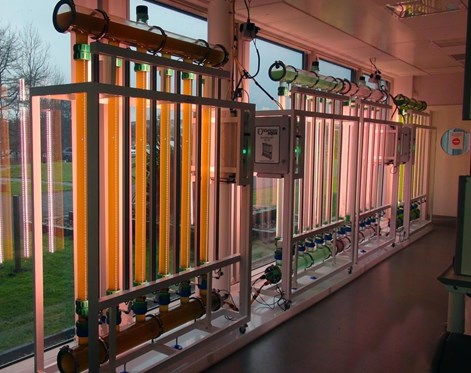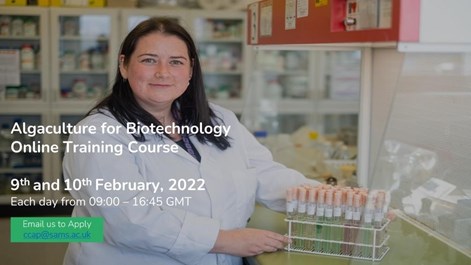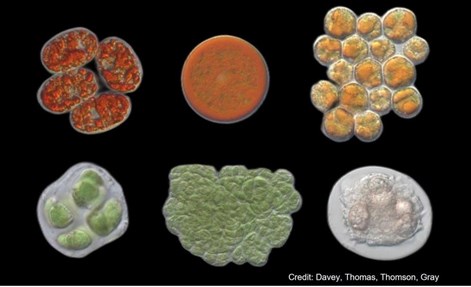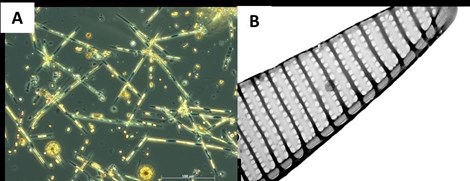CCAP’s activities and updates from November through December 2021.
Thursday 23 DecemberCCAP Research:
CCAP continues to actively engage with flagship genome related research projects. We continue to supply algal genomic material for the Darwin Tree of Life (https://www.darwintreeoflife.org/) and macroalga-All-Code project, in collaboration with University of New York, Abu Dhabi. Exciting news coming imminently!!!
CCAP-ARIES
Road-testing is on-going with the new CCAP-ARIES photobioreactors and down-stream processing equipment.
In late November 2021, we inoculated out four 70L Phyco-lift photobioreactors (PBRs) with four different types of microalgae (see image below).
The four algae that we selected have a broad biodiversity, requirements and behaviour. This was to test the robustness and optimise the performance of the PBRs and harvesting equipment (i.e., membrane filtration and centrifugation).
CCAP-ARIES is yet to be officially launched. However, we are happy to take enquiries in advance.


CCAP Education:
Annual CCAP CPD course:
The next CCAP CPD training course on “Algaculture for Biotechnology” will take place online on the 9th and 10th of February, 2022. https://www.ccap.ac.uk/index.php/algaculture-for-biotechnology-online-training-course/
It will be a mix of online demonstrations, lecture material, Q&A panel sessions with CCAP and SAMS staff and experts from industry/academia.


Short lectures from our SAMS experts and External speakers on:
- Algal Biodiversity & Taxonomy
- Nutrition
- Photosynthesis
- Microalgae Biotechnology: Opportunities and Challenges
- Molecular Phycology and Bioinformatic
- Large scale microalgal culture
- Metabolomics
Practical Demonstrations by our technical experts on:
- Growth media preparation
- Strain Isolation
- Sub-culturing
- Enumeration
- Cryopreservation
- CCAP’s algal scale up facility (CCAP-ARIES)
Opportunities for discussion, questions and networking are timetabled.
This training is being financially supported by the British Phycological Society (BPS) and AlgaeUK, however, a fee of £50 to cover costs will be charged.
Spaces will be limited, so please apply by 14th of January 2022. To apply please email ccap@sams.ac.uk.
Please include the following applicant information:
Your name
Current position & place of work/learning
A short paragraph (200 words max) which highlights your research interest and motivation for applying to the course
Please highlight if you are a member of the British Phycological Society
Below are a few post-course quotes from participants that undertook the course earlier in 2021 this year.
“I particularly enjoyed the break-out sessions. I love the ease with which the speakers delivered the lectures.”
“I personally mostly enjoyed the mixture of talks from the field of research and the hands-on videos. It was a really good mixture. I could not decide which lecture was the most interesting, the mixture was just really good!”
EIT – Sustainable Aquaculture:
Various CCAP Team members were involved with the co-ordination, management, and delivery of the EIT Food – Sustainable Aquaculture Autumn School, funded by the EU.
The EU funded EIT Food “Sustainable Aquaculture” Autumn School successfully ran from the 6-
26th of November. This was organised by Queen’s University Belfast (lead), University of
Cambridge, the Polish Academy of Sciences, Matís in Iceland, and SAMS (Dr Matt Davey and Dr Mikey Ross). The course was delivered online and comprised a mix of “live” lectures, directed learning, and team activities with an entrepreneurial spine relating to all sectors of aquaculture. This was one of four Autumn Schools delivered throughout October and November, the EIT core team heaped praise upon the Sustainable Aquaculture module for the levels of organisation and delivery, having the best attendance and engagement with participants, and the effort and quality from the participants too.
There were 22 participants, from all over the world, with a broad range of academic, industrial, and business backgrounds. They were divided into 5 teams, and throughout the course, they were challenged to come up with an aquaculture venture and present this to a panel of experts, for a chance to win a cash prize.
The business ideas were varied, well-crafted, and innovative. Mikey Ross mentored a team “Sludge circularity” which aimed at a circular economy approach for valorising sludge produced from Recirculating Aquaculture Systems, including production of biogas, hydrogen, and as a fertiliser. The second-placed idea, winning €1000, was “Storyfish” - a traceability/virtual marketplace tool to enabling small-scale farmers to showcase their product at the point of sale and allowing customers with greater access to information about the fish that they are purchasing, which was mentored by Matt Davey. The winning team, pocketing €2000, was “AquaSphere”; a 3D printed artificial reef system that is moored within salmon pens, acting as a refugia for cleaner fish to help combat sea lice.
The course is funded again for delivery in 2022 and CCAP staff will also be key in delivering to more bespoke online and possibly in-person professional development courses in Algal Biotehnology in collaboration with partners in Cambridge University, Matis Iceland and Fraunhofer in Germany.
Ph.D. positions available with CCAP/SAMS staff:
CCAP/SAMS staff have Doctoral Training Partnerships open with the University of Edinburgh.
These include:
“Life at the limits – algal physiology under extreme conditions”
Supervised by Dr Matt Davey (SAMS/CCAP) and Dr Charles Cockell (UoE)
PhD Overview:
This project will characterise the limits of life in cryophilic algae by studying how the growth, physiology and metabolic traits are altered in low pressure and low temperature environmental chambers.

“Titanium diatoms: biocatalysis of emerging micro-contaminants using Ti-doped diatom frustules”
Supervised by Dr Mikey Ross (SAMS/CCAP), Dr Szabolcs Pap (ERI-UHI), Dr Andrea Semião
(UoE) and Prof Margaret Graham (UoE)
PhD Overview:
Emerging micro-contaminants (EMs) are a global water quality threat. Novel nanoparticles, composed of diatom skeletons doped with titanium, will be formulated and investigated for use in oxidative removal of these EMs


Deadline for applications is Thursday the 6th of January at 12:00 GMT. For more information please check: https://www.sams.ac.uk/study/postgraduate/sams-find-a-phd/
For more information and the latest news, please check out the CCAP's website and social media pages (https://www.ccap.ac.uk/).